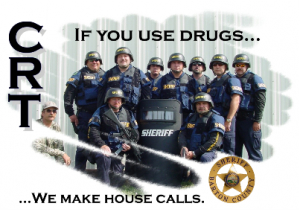
Seriously, just take for example this one item from Sabet's list of things he likes about the drug war:
Intervention: If individuals do start to use drugs, we know that brief interventions (by doctors, coaches, parents, faith leaders, or others) do a pretty good job at stopping the progression of use from non-dependence to addiction.
Others!? Really, Kevin? By "others" did you by any chance mean "cops with machine guns, battering rams, drug sniffing dogs, and flash bang grenades? Cause if you wanna talk about intervention…well that's who's been intervening. When the government hears you might have MARIJUANA in your basement, they don't send a "faith leader" to talk to you about it.
You can try to paint over prohibition, but you'll need a whole hell of a lot of spackle to stuff the bullet holes. The drug war isn't just a big counseling program, it's a bloody f#%king mess and everybody knows that's what it is because we get our news from watching the damn news, not from reading Kevin Sabet for breakfast.
Pretending our drug policy is all about treatment and prevention might feel good to the professional spokespeople who get paid to say so, but it doesn't work in a world that's watching as a war unfolds before us. All that happy crap about helping people is great and good, but we're also watching every day as the drug war destroys lives right in front of our faces and we want to know what's being done about that. Talking about treatment isn’t an acceptable answer to our questions about the continuing destruction that's being done with the billions of dollars that aren't spent on treatment.
After all, if you can't acknowledge the very worst about the drug war when defending it, you aren't really defending it at all. If responsible adults don't get roughed up and arrested for taking drugs in Kevin Sabet's essays and speeches, then it stands to reason that responsible adults shouldn’t have to get roughed up and arrested for taking drugs in real life either.
Follow Scott Morgan on Twitter: www.twitter.com/drugblogger
This work by StoptheDrugWar.org is licensed under Creative Commons Attribution-ShareAlike 4.0 International
Add new comment